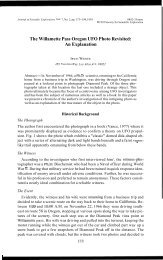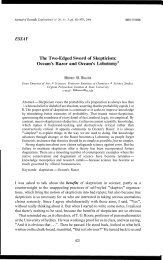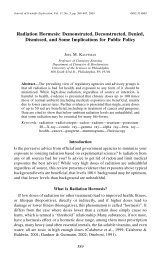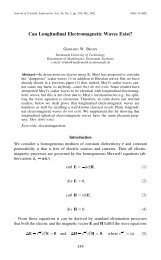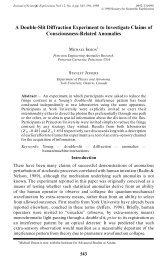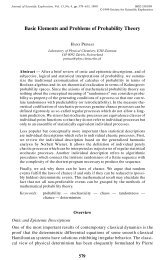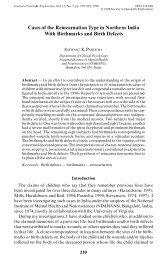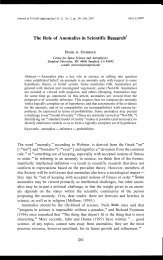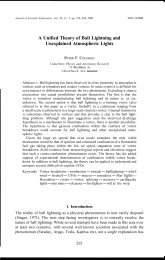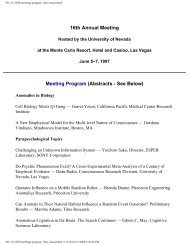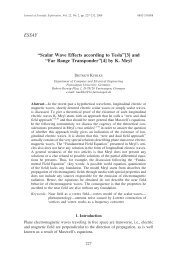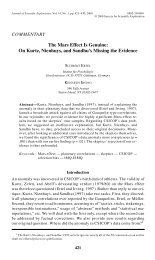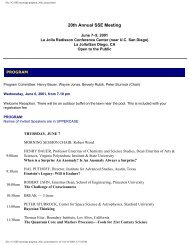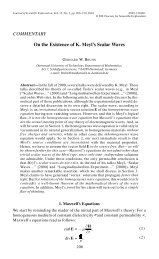REVIEW ARTICLE Ufology: What Have We Learned? - Society for ...
REVIEW ARTICLE Ufology: What Have We Learned? - Society for ...
REVIEW ARTICLE Ufology: What Have We Learned? - Society for ...
Create successful ePaper yourself
Turn your PDF publications into a flip-book with our unique Google optimized e-Paper software.
582 M. D. Swords<br />
what he is trying to do researchwise, as well) said with an air of august<br />
dismissiveness: Thanks, Mike, <strong>for</strong> the entertainment, but we all know that the<br />
extraterrestrial hypothesis has proven a complete failure. <strong>We</strong>ll. How generous.<br />
And how open-minded and creative. This, thankfully, is not typical SSE<br />
behavior. <strong>We</strong> saw our better side in the fine dialogue that Jacques Vallee and<br />
Robert Wood had in this very journal on this topiclo5.<br />
Sometimes, It's Science<br />
Is ufology a science? Is biology? Is geology? This way of talking about things<br />
seems like a lot of what we all do-throw words together (and at one another)<br />
which have a vague meaning to ourselves and a different vague meaning to<br />
the persons we are talking to. If we had a Big Book of Biology, there are<br />
probably things in there that we, and most people, would call "scientific," and<br />
things that we wouldn't. And there might not be universal agreement about what<br />
is and what is not.<br />
Let's imagine that some biologists claim that once upon a time there was<br />
a thing called an ivory-billed woodpecker. Is that a "scientific fact"? <strong>We</strong>ll, they<br />
say they have evidence: lots of folks who said they saw lots of them in the old<br />
days; paintings, etc., of them; and some dried-up old husks that are claimed to<br />
have been them. Upon surveying the literature, we have difficulty coming up<br />
with any controlled-variable laboratory testing of the alleged woodpeckers but<br />
some alleged audio-recordings are said to exist. But no one seems particularly<br />
emotional about their alleged existence and so the statement that they used to<br />
exist is stated as a com<strong>for</strong>table, scientific fact: it is Science. Now, it's also stated<br />
that they are now extinct. Is that a scientific fact? Hmm. It's stated with the same<br />
com<strong>for</strong>table assurance and almost the same sentence structure, right alongside.<br />
But is it "Science"? It claims, and seems, to have to do with biology, that's clear<br />
enough, but . . . ? No physical lab-top experiment has been done to "prove" that<br />
there are no more ivory-bills and one could never cover the globe to do so, so<br />
what's the theoretical status of that biological "fact"? And what if some folks<br />
down South claim that they have seen one? And what if they say that they've got<br />
a (poor) picture and an audio-recording? Does their witnessing bear upon the<br />
"scientific" nature of this biological claim? Does their photography? Does their<br />
audiotape? Are their reports, photography, and audiotapes the first elements of<br />
a "scientific investigation" or are they nothing to do with science at all? And<br />
what if someone takes the photograph and applies technology to do an image<br />
analysis and comparison to known images of ivory-bills from the past? Is any<br />
of that "doing Science"? And what if someone does a sound analysis and compares<br />
it to all currently known birds (and finds no matches except a class<br />
similarity to certain other woodpecker types)? Was that person doing science?<br />
Even if he or she didn't have a biology degree? And, if a witness brought in<br />
a sample of bird poop that he said dropped from an ivory-bill and a biochemist<br />
did lab tests on it, was there Science involved?



